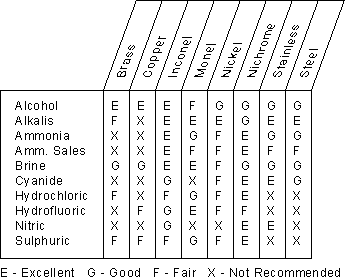The following general metal comparison is intended as a guide only to help you select the optimum metal for your application.
Virtually all metals can be woven into wire cloth. For best results, please describe the application on your order or discuss it with your metallurgist.
STEEL
Low carbon C1008 most commonly used. High carbon/hard drawn for high tensile strength. Oil tempered high carbon for high tensile strength and good abrasion resistance.
STAINLESS STEEL
Long life under severe corrosion and temperature conditions...Type 304 SS is the most common...other types available as specified.
HEAT RESISTING ALLOYS
High nickel chromium and nickel copper alloys such as monel and inconel withstand temperatures up to 1800 degrees F...resist corrosion in acids, sea water and caustic solutions.
NICKEL
Excellent corrosion resistance in most environments except sulfurous conditions...most commonly used petrochemical and heat treating applications.
ALUMINUM
Light weight, good electrical conductor and resists atmospheric corrosion...5056 alloy is used for higher strength.
COPPER
Good formability with excellent electrical and thermal conductivity...resists corrosion from fresh and saltwater, alkaline solutions and atmosphere...low tensile strength.
BRASS
Most common 80% copper/20% zinc...good formability with lower thermal conductivity and higher tensile strength than copper...resists corrosion like copper.
BRONZE
Most common 90% copper/10% zinc...better corrosion resistance and lower strength than brass.
RARE METALS
Such as tantalum, molybdenum, silver and platinum can be furnished as specified.

Approximate Maximum Operating Temperatures (Degrees Fahrenheit)
- Stainless Steel 1500°
- Incoloy 1600°
- Stainless Steel 330 1650°
- Nichrome 1700°
- Inconel 1800°
- Nichrome V 2000°
- Nickel 2700°
- Molybdenum 4700°
Conversion Factors For Various Metals
The weights shown for square mesh are based on plain steel. To find the approximate weight for wire manufactured of other metals, multiply the weight of plain steel wire by the appropriate factor given in the table below.
- Aluminum (Pure) 0.347
- Aluminum (5056-S) .0342
- Brass, High (70/30) 1.088
- Brass, Low (80/20) 1.105
- Broze, Commerical (90/10) 1.123
- Bronze, Phosphor (Grade A) 1.131
- Copper 1.141
- Gold 2.460
- Hastelloy C-276 1.142
- Incoloy 1.030
- Inconel 1.090
- Iron 1.002
- Molybdenum 1.299
- Monel 1.134
- Nichrome I 1.045
- Nichrome V 1.066
- Nickel 1.129
- Platinum 2.731
- Silver 1.336
- Stainless Steel (302, 304) 1.010
- Steel 1.000
- Tantalum 2.114
- Titanium .582
- Tungsten 4700°